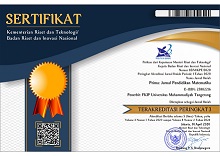The Development of E-Book Using Flip Pdf Pro Through Missouri Mathematics Project Model to Improve Metacognition Abilities and Mathematical Self-Efficacy of Dharma Pancasila Medan High School Students
Abstract
Keywords
Full Text:
PDFReferences
Abdurrahman, M. (2011). Anak Berkesulitan Belajar Teori, Diagnosis dan Remediasinya. Jakarta: Rieneka Cipta.
Bandura, A. (1998). Self-Efficacy: Towards a Unifying Theory of Behavioral Change. Standford University. Retrieved from http://www.uky.edu/~cushe2/Bandura/Bandura1977PR.pdf
Bruning, R. H., Schraw, G. J., & Ronning, R. R. (1995). Cognitive Psychology and Instruction, Second Edition. New Jersey: Prentice Hall.
Flavell, J. H. (1976). Metacognitive aspects of problem solving. (Ed) The nature of intelligence. Retrieved from http://tip.Psycology.org/meta.html
Good, T. L., & Grows, D. A. (1979). The Missouri Mathamtics Effectiveness Project: An experimentalstudy and fourth-grade classrooms. Journal of Educational pyscholog, 71, 3.
Hake. (1999). Analyzing charge Gain scores. America Educational Research Association’s Division, Measurrement and Research Methodology.
Hanikah., Faiz, A., & Nurhabibah, P (2022). Penggunaan Media Interaktif Berbasis Ebook di Sekolah Dasar. Junal Basicedu. 6(4), 7356.
Hasratuddin. (2015). Mengapa Harus Belajar Matematika? Medan: Perdana Publishing.
Livingston, J. (1997). Metacognition: An Overview. Retrieved Oct. 23, 2015.
Mukhid, A. (2009). Self Efficacy (Perspektif Teori Kognitif Sosial dan Implikasinya terhadap Pendidikan). Tadris, 4(1): 108-122.
Papaleontiou. (2008). Metacognition and Theory of Mind. Cambridge Sholars Publishing: Newcastle, UK.
Sani, N. F., Farida., & Andriani, S. (2020). Analisis Kemampuan Metakognisi Siswa Ditinjau Dari Gaya Belajar Berdasarkan Pembelajaran Missouri Mathematics Project (MMP) dan Pembelajaran Discovery Based Learning (DBL). MAJU, 7(2): 1-10.
Schraw, G. (1998). Promoting general metacognitive awareness. Instructional Science, 26(1-2),113-125.
Shoenfeld. (1992). What’s All The Fuss About Metacognition. Available: http://mathforum.org/~sarah/Discussion.Sessions/Schoenfeld.html.
Sinaga, B. (2007). Pengembangan Model Pembelajaran Matematika Berdasarkan Masalah Berbasis Budaya Batak (PBM-B3). Disertasi. Surabaya: Program Pascasarjana Universitas Negeri Surabaya.
Siswono, T. Y. (2019). Paradigma Penelitian Pendidikan; Pengembangan Teori dan Aplikasi Pendidikan Matematika. Bandung: PT Remaja Rosdakarya.
Sudjana. (2005). Metode Statistika. Bandung: Tarsito.
Sunaryo, Y. (2017). Pengukuran Self-efficacy Siswa Dalam Pembelajaran Matematika Di Mts N 2 Ciamis. Jurnal Teori dan Riset Matematika (TEOREMA), 1(2), 39-44.
Suri, I. R. A., Pahrudin, A., & Apriyana, E. (2023). Missouri Mathematics Project learning model with strategy Everyone is a Teacher Here to towards mathematical problem-solving and self-efficacy ability. Alifmatika: Jurnal Pendidikan dan Pembelajaran Matematika, 5(1), 141-155.
Suryaningtyas, S., & Setyaningrum, W. (2020). Analisis Kemampuan Metakognisi Siswa SMA Kelas XI Program IPA Dalam Pemecahan Masalah Matematika. Jurnal Riset Pendidikan Matematika, 7(1), 74-87.
Tasci, B. G. (2015). Project Based Learning from Elementary School to College, Tool: Architecture. Procedia - Social and Behavioral Sciences, 186, 770–775.
Trianto. (2010). Mendesain Model Pembelajaran Inovatif-Progresif. Jakarta: Kencana Prenada Media Grup.
Trianto. (2017). Mendesain Model Pembelajaran Inovatif, Progresif, dan Kontekstual. Jakarta: Kencana.
Wulandari, S. (2020). Media Pembelajaran Interaktif Untuk Meningkatkan Minat Siswa Belajar Matematika di SMP 1 Bukit Sundi. Indonesian Journal of Technology, Informatics and Science (IJTIS), 1(2), 43-48.
Yahya, R., Ummah, S. K., & Effendi, M. M. (2020). Pengembangan Perangkat Pembelajan Flipped Classroom Bercirikan Mini-Project. Jurnal SJME (Supremum Journal of Mathematics Education), 4(1), 78-91.
Yusminar (2014). E-Book Dan Pengguna Perpustakaan Perguruan Tinggi di Jakarta. Al-Maktabah, 3(1), 34-39.
Zakiah, N. V. (2020). Level Kemampuan Metakognisi Siswa Dalam Pembelajaran Matematika Berdasarkan Gaya Kognitif. Jurnal Riset Pendidikan Matematika, 7(2), 132–147.
Zimmerman, B. J. (2000). Self- Efficacy: An Essential Motive to Learn. In Self-efficacy beliefs. Contemporary Educational Psychology. Tersedia [online]:(http://www.upo.es/psicologiadeldeporte/doc/articulo_deborah_fel_tz.pdf, diakses 09 Juli 2023).
Zulkosky, K. (2009). Self- Efficacy: A concept Analysis. Journal Compilation Nursing Forum, 44(2), 93-102.
DOI: http://dx.doi.org/10.31000/prima.v8i2.11222
Article Metrics
Abstract - 908 PDF - 481Refbacks
- There are currently no refbacks.
Prima: Jurnal Pendidikan Matematika
Program Studi Pendidikan Matematika
Fakultas Keguruan dan Ilmu Pendidikan
Universitas Muhammadiyah Tangerang
Jl. Perintis Kemerdekaan I/33, Cikokol
Kota Tangerang, Indonesia
e-mail: primajpm@gmail.com
Prima: Jurnal Pendidikan Matematika (p-ISSN: 2579-9827 | e-ISSN: 2580-2216) is licensed under a Creative Commons Attribution 4.0 International License.







